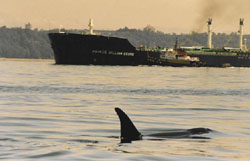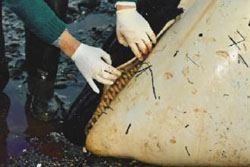|
|
Oil and Chemical Resistant Whales, Otters and Birds?
Can endangered marine wildlife, such as whales, otters and birds, evolve to a biological
state of being resistant to the harmful effects of oil and chemical contamination? No
magic bullets on the horizon but essential methodologies can be developed to help
wildlife "resist" travelling in polluted waters.
 While some deterrents have been developed to scare birds out of polluted areas there
is no consistent, permanent approach to protect these and other species because
species-specific considerations must be explored further and volunteer availability must
be permanent. Decisions to employ such methods should be based on speciesí
behaviour and designated to knowledgeable persons/organizations who have
permanent standby status.
While some deterrents have been developed to scare birds out of polluted areas there
is no consistent, permanent approach to protect these and other species because
species-specific considerations must be explored further and volunteer availability must
be permanent. Decisions to employ such methods should be based on speciesí
behaviour and designated to knowledgeable persons/organizations who have
permanent standby status.
Employing sounds as "attractors" and "deterrents" can be implemented to protect all
species that could be exposed. This would include endangered orcas. Populations of
orcas in the Pacific Northwest are facing extinction as a result of human impacts.
First, methods must be developed and/or refined to be species specific.
 Secondly, there should be training and task designation. A WERT (Wildlife Emergency Response Team)
should be part of the chemical/oil response efforts to prevent wildlife exposure. A
committee of related organizations could organize the development of these programs.
They must be contracted in order to be able to provide ongoing services. Funding may
be stipulated under Federal legislation such as the Canada Shipping Act. Other funding
sources could include company sponsorships.
Secondly, there should be training and task designation. A WERT (Wildlife Emergency Response Team)
should be part of the chemical/oil response efforts to prevent wildlife exposure. A
committee of related organizations could organize the development of these programs.
They must be contracted in order to be able to provide ongoing services. Funding may
be stipulated under Federal legislation such as the Canada Shipping Act. Other funding
sources could include company sponsorships.
 Download Oil and Chemical Resistant Publication Download Oil and Chemical Resistant Publication
|
|